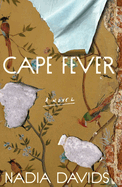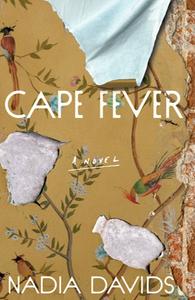
 "I come highly recommended to Mrs. Hattingh through sentences I tell her I cannot read." South African novelist Nadia Davids's twisting gothic drama Cape Fever, her U.S. debut, opens by highlighting narrator Soraya's ability to read, which she keeps from her employer. Soraya goes to work for the settler Mrs. Hattingh in 1920: hired as a combined cleaner and cook, the younger woman understands that the elder is not as wealthy as she wishes to appear. In the colonial city in which Mrs. Hattingh reigns over a large, lonely home, Soraya's close-knit, loving family lives in the nearby Muslim quarter; Soraya is permitted by her employer to visit only rarely. Her father is an artist in religious calligraphy, creating beautiful works of prayer and devotion. The word "proclaim," he instructs her, is "also read, recite. You see? For us, to read, to recite, is one," and "The person is a pen. The person is paper." Soraya's fiancé, Nour, is an accomplished scholar who works on a farm while saving for teachers' college.
"I come highly recommended to Mrs. Hattingh through sentences I tell her I cannot read." South African novelist Nadia Davids's twisting gothic drama Cape Fever, her U.S. debut, opens by highlighting narrator Soraya's ability to read, which she keeps from her employer. Soraya goes to work for the settler Mrs. Hattingh in 1920: hired as a combined cleaner and cook, the younger woman understands that the elder is not as wealthy as she wishes to appear. In the colonial city in which Mrs. Hattingh reigns over a large, lonely home, Soraya's close-knit, loving family lives in the nearby Muslim quarter; Soraya is permitted by her employer to visit only rarely. Her father is an artist in religious calligraphy, creating beautiful works of prayer and devotion. The word "proclaim," he instructs her, is "also read, recite. You see? For us, to read, to recite, is one," and "The person is a pen. The person is paper." Soraya's fiancé, Nour, is an accomplished scholar who works on a farm while saving for teachers' college.
There are moments in which Soraya feels something like fellowship with her employer, when she intuits that "every woman, rich or poor, madam or maid, dreams of escape." But working for and living with Mrs. Hattingh, under power structures bigger than the individual, is deeply unpleasant. "She's never understood the scale of what she wants and asks for." Soraya retreats, in her small room, into the stories and characters that have come to her all her life: the Gray Women, as she terms the spirits that she alone can see; a seawoman with ink for blood; a woman who makes a baby out of soap. She finds Mrs. Hattingh's house is teeming with spirits.
Mrs. Hattingh introduces a new comfort and stressor when she offers to write to Nour on Soraya's behalf. As one woman takes the voice of the other--and intercepts the correspondence that arrives in return--their identities blur in disturbing ways. Soraya holds what she can of her own life in private and cherishes her visits to her family's home, until even these are forbidden. In the increasingly claustrophobic manor, the tension between the two women builds, resulting in complex layers of psychological intrigue amid themes of class, race, love, grief, and haunting. In Soraya's compelling voice, Davids blends mysticism, quiet power and resistance, and pain born of a long stretch of history in this unsettling tale of suspense. Cape Fever is beautiful, discomfiting, and moving. --Julia Kastner, blogger at pagesofjulia
Shelf Talker: A lonely colonial woman offers to write letters to the fiancé of her maid and the two become disturbingly intertwined in this evocative gothic tale of race, class, and spirits.

